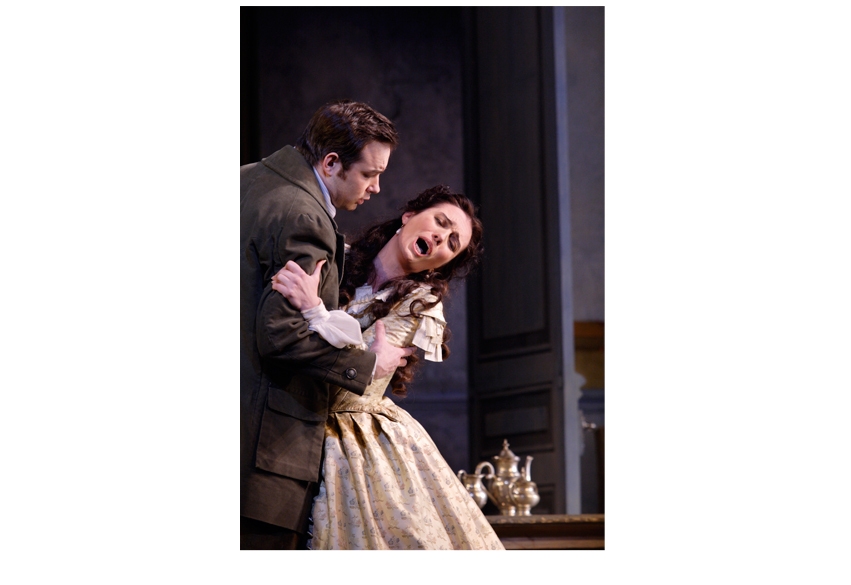As I’m not the first person to have pointed out, the Royal Opera has indulged in a truly phenomenal number of performances of La Traviata this season, in the largely traditional production by Richard Eyre, which opened in 1994 with Angela Gheorghiu making her name. The three main roles have been cast differently for these three runs of performances, of which the last has just begun.
It’s the kind of production that allows plenty of scope for individual interpretations, and in the many revivals I have seen of it the two outstanding pieces of casting have been the Alfredo of Jonas Kaufmann in 2008, which showed how interesting this usually wooden role can be with an interpreter of genius; and the still more remarkable account of Germont by Simon Keenlyside a couple of months ago; while Anna Netrebko, also in 2008, was the best of the Violettas I have seen.
It so happens that I got a DVD of the opera to review, at the same time as seeing this latest revival, of a performance given in Graz on 11 March last year, and directed by that ancien enfant terrible Peter Konwitschny. The production, as one would expect, is at the opposite pole from Eyre’s, with the director’s training in Brechtian theatre apparent at every moment. There is a 20-minute bonus, quite engaging, of Konwitschny talking about the work (‘the opera of all operas’ he calls Traviata, though this is his first assault on it) and rehearsing some of its key scenes.
He thinks that Violetta is the only live person in the work, Alfredo merely being someone — anyone — to love, and being directed accordingly as a nerd in a duffel coat and wearing glasses (always the sign of a hopeless, helpless character in opera), and his father a piece of social machinery. I was inclined to the latter view until Keenlyside make me realise how much Germont is, or can be made to be, a fellow-sufferer.
Konwitschny introduces a character, too: the daughter whose fiancé won’t marry her while her brother has an affair with a courtesan. This daughter, however, has plaits and shares the family’s visual impairment, and seems to be about 14. Germont knocks and throws her around and it is Violetta who protects and comforts her. A shade heavy-handed, even for Regietheater — though Konwitschny insists he is not ‘one of those’. If you go on to Amazon you can see what fiercely opposed reactions this production has already provoked, and I think I share almost all of them. I don’t mind that the action is updated — as Konwitschny says, we are still muddle-headed about ‘the whole sex thing’, and attitudes to prostitution aren’t much different now from what they were in Verdi’s time. On the other hand, Germont has to be made a wholly preposterous figure in order to figure at all. And of course, as with updatings of La Bohème, there is the question of why Violetta doesn’t get herself some antibiotics.
Konwitschny really wants to strip away interest from everyone else so that we can just contemplate Violetta meeting her fate, as it might be Milly Theale in The Wings of the Dove. And he has the singer for the part — Marlis Petersen, glorious and intense in every respect, though she sometimes looks as if she might metamorphose into Lulu, a role in which Petersen does excel; and when, during the crucial scene with Germont, she gets a revolver out of her handbag and points it first at herself and then at Germont, one wonders whether Konwitschny’s mind hasn’t strayed; it is an absurd touch.
What may offend people most with the Graz production is the cutting of the opera, though I welcome almost all of it, especially the elimination of aria repeats, and of some of the cabalettas; and unreservedly that of the matadors and gypsies in the third scene; on the other hand, the cutting of Violetta’s letter-writing, and the extremely moving clarinet solo that accompanies it, is a crime. Overall, the musical interpretation is spruce and pointed to a degree, under Tecwyn Evans, and I shall certainly listen, probably watch, again.
The Royal Opera had Maurizio Benini back to conduct, and though the orchestra was as excellent as usual, this was all routine stuff, for an audience out for an evening’s light entertainment, to be applauded as often as possible. Ermonela Jaho has gone from strength to strength as Violetta, but there isn’t much individuality in her conception, though a great deal more identification with the role than was manifest from either Stephen Costello as Alfredo, admirable as his singing is; or from Paolo Gavanelli as Germont, to whom I feel the Royal Opera has been loyal for long enough. He bawls, but without menace or authority, and scarcely acts at all. I’m sure that Traviata needs to be in the repertoire, to help balance the books, but it is high time for a new production to be envisaged, preferably with Marlis Petersen as its first star.






Comments